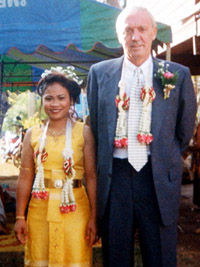
Ansar al-Islam in Kurdistan, simply called Ansar al-Islam, also nicknamed the Kurdish Taliban, is a Kurdish Islamist militant and separatist group. It was established in northern Iraq around the Kurdistan Region by Kurdish Islamists who were former Taliban and former Al-Qaeda members, coming back from Afghanistan, in 2001. Its motive is to establish an Islamic state around the Kurdistan region. It imposed strict Sharia in villages it controlled around Byara near the Iranian border. Its ideology follows a traditionalist interpretation of the Quran and Salafism.
Events in the year 2004 in Iraq.

Jamaat Ansar al-Sunnah, also known as Jaish Ansar al-Sunna, Ali ibn Abi Talib Battalion or simply as Ansar al-Sunnah was an Iraqi Sunni insurgent group that fought against US troops and their local allies during the Iraq War. The group was primarily based in northern and central Iraq, and included mostly Iraqi fighters. In 2007, it split into two groups; with its Kurdish members creating a group called Ansar al-Islam, and its Arab members creating a group called Ansar al-Sunnah Shariah Committee, before changing its name to Ansar al-Ahlu Sunnah in 2011.

Nicholas Evan Berg was an American freelance radio-tower repairman who went to Iraq after the United States' invasion of Iraq. He was abducted and beheaded according to a video released in May 2004 by Islamist militants in response to the Abu Ghraib torture and prisoner abuse involving the United States Army and Iraqi prisoners. The CIA claimed Berg was murdered by Abu Musab al-Zarqawi. The decapitation video was released on the internet, reportedly from London to a Malaysian-hosted homepage by the Islamist organization Muntada al-Ansar.

Jama'at al-Tawhid wal-Jihad, which may be abbreviated as JTJ or Jama'at, was a militant Jihadist group. It was founded in Jordan in 1999 and was led by Jordanian national Abu Musab al-Zarqawi for the entirety of its existence. During the Iraqi insurgency (2003–11), the group became a decentralized network with foreign fighters and a considerable Iraqi membership.

Kenneth John Bigley was a British civil engineer who was kidnapped in the al-Mansour district of Baghdad, Iraq, on 16 September 2004, along with his colleagues Jack Hensley and Eugene Armstrong, both United States citizens. The three men were working for Gulf Supplies and Commercial Services, a Kuwaiti company working on reconstruction projects in Iraq. The men knew their home was being watched and realised they were in great danger when their Iraqi house guard informed them he was leaving due to threats by militias for protecting American and British workers. Bigley and the two Americans decided it was worth the risk and continued to live in the house. All were subsequently kidnapped and later murdered by beheading.

The Islamic Army in Iraq (IAI) is one of a number of underground Islamist militant organizations formed in Iraq following the 2003 invasion of Iraq by U.S.-led Coalition forces, and the subsequent collapse of the Ba'athist regime headed by Saddam Hussein.

Shosei Koda was a Japanese citizen who was kidnapped and later beheaded in Iraq on 29 October 2004, by Abu Musab al-Zarqawi's group, while touring the country. He was the first Japanese person beheaded in Iraq.

Mosul International Airport is an airport located at Mosul, capital of Nineveh Governorate, Iraq. It became a civil airport in 1990 with the rebuild of the runway and construction of a new terminal. After undergoing major renovations to be able to reach international standards and category 1 status, it reopened as a civilian airport on 2 December 2007. On 9 June 2014, it was captured by militants from ISIL.
Members of the Iraqi insurgency began taking foreign hostages in Iraq beginning in April 2004. Since then, in a dramatic instance of Islamist kidnapping they have taken captive more than 200 foreigners and thousands of Iraqis; among them, dozens of hostages were killed and others rescued or freed. In 2004, executions of captives were often filmed, and many were beheaded. However, the number of the recorded killings decreased significantly. Many hostages remain missing with no clue as to their whereabouts. The United States Department of State Hostage Working Group was organized by the U.S. Embassy, Baghdad, in the summer of 2004 to monitor foreign hostages in Iraq.
A beheading video is a form of propaganda or snuff video in which hostages are graphically decapitated. It is often employed by groups seeking to instill shock or terror into a population, whilst beheading has been a widely employed public execution method since the ancient Greeks and Romans, videos of this type only began to arise in 2002 with the beheading of Daniel Pearl and the growth of the Internet in the Information Age which allowed groups to anonymously publish these videos for public consumption. The beheadings shown in these videos are usually not performed in a "classical" method – decapitating a victim quickly with a blow from a sword or axe – but by the relatively slow and torturous process of slicing and sawing the victim's neck, while still alive, with a knife. Despite the number of groups and ideologies that employ this form of propaganda, the process is overwhelmingly associated with Islamist extremists.
Atwar Bahjat was an Iraqi journalist. Initially a reporter for Iraq's state-controlled television under Saddam Hussein, Bahjat became a popular television correspondent for al-Jazeera and later al-Arabiya following the US invasion of Iraq. On 22 February 2006, Bahjat was hunted down and shot in cold blood along with her colleagues Adnan Al Dulaimi and Khalid Al Fellahi while covering a story in Samarra.

The Mujahideen Shura Council (MSC), was an umbrella organization of at least six Sunni Islamic insurgent groups taking part in the Iraqi insurgency against U.S. and coalition and Iraqi forces: Tanzim Qaidat al-Jihad fi Bilad al-Rafidayn, Jaish al-Ta'ifa al-Mansurah, Katbiyan Ansar Al-Tawhid wal Sunnah, Saraya al-Jihad Group, al-Ghuraba Brigades, and al-Ahwal Brigades.
The Forward Operating Base Marez bombing took place on December 21, 2004. Fourteen U.S. soldiers, four U.S. citizen Halliburton employees, and four Iraqi soldiers allied with the U.S. military were killed by a suicide bomber in a dining hall at the Forward Operating Base next to the main U.S. military airfield at Mosul.
Piotr Stańczak was a Polish geologist who was beheaded by Islamic terrorists in Pakistan in February 2009.

In the 2010 Baghdad church massacre, six suicide bomber jihadists of a group called Islamic State of Iraq attacked a Syriac Catholic church in Baghdad during Sunday evening Mass, on 31 October, 2010, and began killing the worshipers. The Islamic State of Iraq, according to Agence France-Presse news agency, was a militant umbrella group to which al-Qaeda in Iraq belongs.

Fadel Ahmed Abdullah al-Hiyali, better known by his noms de guerre Abu Muslim al-Turkmani, Haji Mutazz, or Abu Mutaz al-Qurashi, was the Islamic State of Iraq and the Levant (ISIL) governor for territories held by the organization in Iraq. He was considered the ISIL second-in-command ; he played a political role of overseeing the local councils and a military role that includes directing operations against opponents of ISIL. His names were also spelt Fadhil Ahmad al-Hayali, and Hajji Mutazz.

The Timeline of the War in Iraq covers the War in Iraq, a war which erupted that lasted in Iraq from 2013 to 2017, during the first year of armed conflict.
In early 2014, the jihadist group Islamic State of Iraq and the Levant captured extensive territory in Western Iraq in the Anbar campaign, while counter-offensives against it were mounted in Syria. Raqqa in Syria became its headquarters. The Wall Street Journal estimated that eight million people lived under its control in the two countries.
This article contains a timeline of events from January 2015 to December 2015 related to the Islamic State of Iraq and the Levant (ISIL/ISIS). This article contains information about events committed by or on behalf of the Islamic State, as well as events performed by groups who oppose them.










